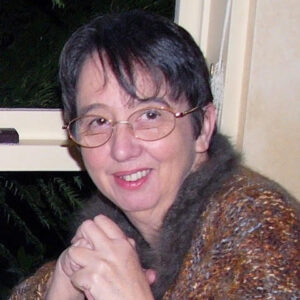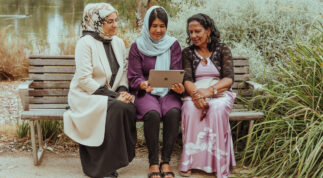Are you up to date on your COVID boosters? Do you remember how scary it was when COVID first struck, a totally new virus sweeping the world and we had no vaccine? People were desperately ill or dying and we didn’t know if we’d be next. Now we have those revolutionary mRNA vaccines and the infection has mostly become like a bad cold.
What you possibly don’t know is that the development of those vaccines rested on a lifetime’s research by a woman named Katalin Kariko and that she and her collaborator were awarded the 2023 Nobel Prize for Physiology and Medicine. The citation read “For their discoveries concerning nucleoside base modifications that enabled the development of effective RNA vaccines against COVID-19.”
Before I tell you about Katalin, I need to explain RNA and what is meant by nucleoside base modification.
We all know about DNA. It carries the code that determines the proteins our cells produce and these in turn mediate all our functions. But proteins are produced in the cytoplasm of the cell, while DNA is isolated in the nucleus. Therefor a message must pass from the nucleus to the cytoplasm and this is the function of messenger RNA or mRNA. The code in both DNA and RNA is carried by those nucleoside bases.
Katalin Kariko was born in in 1955 in a small town in Hungary under the communist regime. In her autobiography she describes a hard but loving childhood. Every step of her scientific career now seems a preparation for her later achievement, but it was a tough road with many setbacks. In Hungary in 1975, straight out of University, she was involved in the synthesis of liposomes, tiny sacs of lipids that could be filled with a desired material and used to fuse with cell membranes. In this way the material would penetrate the cell and be used for therapy. This technique was later used to deliver mRNA vaccines into our cells.
Moving to her PhD in 1980, her obsession with RNA began with the attempt to produce an antiviral therapeutic based on RNA. Synthesising RNA is not easy as it is unstable and requires the most scrupulous care at every step. Work was funded by a commercial partnership but ultimately progress was too slow for commerce, and funding was withdrawn.
Having mastered RNA synthesis, she was out of a job. It 1984 she found one in Philadelphia. She worked here for some years, learning more about RNA, but it was not a happy lab and she eventually applied for a position elsewhere. Over time she moved through a number of postings.
Sometimes she faced outright antagonism, and when she found a congenial collaborator, they seemed to melt away in pursuit of their own career.
Always she faced a chronic shortage of grant money because repeated grant applications were turned down by referees who believed that the difficulty of handling RNA was insurmountable, and possibly by prejudice against women scientists. But all the time she was learning.
It was not until late 1990s that she met her ideal collaborator, Drew Weissman. It was a chance meeting at the photocopier that began a conversation. They found their aims and expertise were perfectly complementary. Drew wanted to produce a vaccine against HIV by introducing DNA into cells and inducing them to produce one of the HIV proteins. Katalin persuaded him to try mRNA.
At first, disaster! Even in the test tube, the RNA triggered the cells to release a cascade of cytokines, chemical messengers that in excess can be fatal. (Remember toxic shock syndrome?) This was deeply worrying. Cells are full of RNA. Why was it not causing cytokine cascades?
At this stage it was thought that all RNA was chemically the same and it took a further 10 years to find the solution. By comparing RNA from many different sources, she was able to define those that did or did not induce cytokines, then look for differences in their structure. Eventually she found that the natural mRNA was chemically modified in the cell, and if they used the same modifications in their synthetic RNA it did not cause the cytokine cascade. Better still, it induced production of even more protein.
Published in 2005, the work still did not receive acclaim or funding and again she lost her job.
This time it was a company in Germany that gave her a job – BioNTech. You might remember their name in conjunction with Pfizer on our vaccines. It was of course with the COVID pandemic 15 years later that her discoveries came into their own.
Fortunately, the genetic code for the virus was published by a Chinese scientist very early in the pandemic, so scientists were able to derive the code for the structure on the virus that allowed it to enter the cell. This was synthesized as the chemically modified mRNA. The product was then encased in a liposome, those sacs of lipids she had studied at the very beginning of her career, and the complex injected into us. There it could penetrate our cells and cause the production of receptor proteins, triggering an immune response. When a new variant of COVID arises, a new mRNA code can be used.
The outcome was the 2023 Nobel Prize for Katalin and Drew, and the vaccine that continues to protect us from each new version of the COVID virus.
 Christina Cheers spent 30 years in the Department of Microbiology and Immunology, running her own research laboratory investigating immunity to infection, and lecturing to Science students on immunology. Her research resulted in the publication, jointly with her students, of numerous papers, many of them still quoted 20 years later.
Christina Cheers spent 30 years in the Department of Microbiology and Immunology, running her own research laboratory investigating immunity to infection, and lecturing to Science students on immunology. Her research resulted in the publication, jointly with her students, of numerous papers, many of them still quoted 20 years later.
After she retired, the Australian and New Zealand Society for Immunology made her an Honorary Life Member and established a teaching award in her name.



